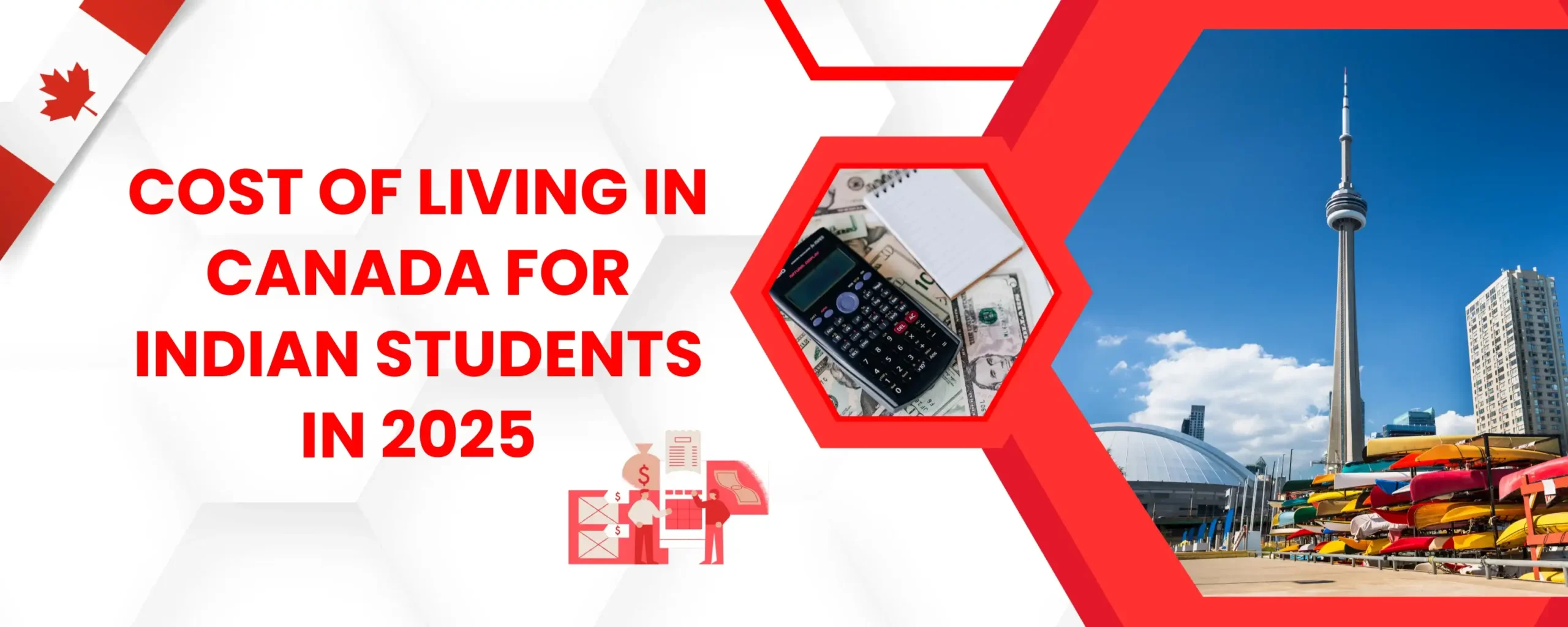Canada continues to shine as a top choice for Indian students due to its world-class universities, post-study work opportunities, and multicultural environment. More than that the living expenses in Canada are generally cheaper than other destinations like the USA or UK. So, this blog is an answer to “how much does it cost to study in Canada?” It is very important to know what to expect financially to plan better and avoid last-minute surprises. In this blog, we’ll break down the average monthly expenses for Indian students in Canada and share some smart saving tips to make your journey smoother.
Average Monthly Living Cost for Indian Students in Canada
On average, Indian students spend around CAD 1,200 to CAD 2,000 per month, which is roughly ₹74,000 to ₹1,24,000. These costs can vary depending on the city, lifestyle, and housing choices. For example, living in a shared apartment in a smaller city like Halifax will cost less than staying alone in downtown Toronto. Here’s what your monthly expense might look like:
| Expense Category | Estimated Cost (CAD) | Cost in INR (approx.) |
| Rent (shared) | 500–800 | ₹31,000–₹50,000 |
| Food & groceries | 200–300 | ₹12,000–₹18,500 |
| Transport | 80–120 | ₹5,000–₹7,500 |
| Phone & Internet | 50–80 | ₹3,000–₹5,000 |
| Miscellaneous | 100–200 | ₹6,000–₹12,500 |
| Total | 1,200–2,000 | ₹74,000–₹1,24,000 |
Now let’s break down all major expenses from accommodation and food to transport and health insurance to help you plan your finances better.
Tuition Fees for Indian Students in Canada
Tuition fees are often the largest part of a student’s budget. The cost of studying varies based on the level of study, program type, and university you choose. But overall, they remain more affordable compared to other top study destinations. Here’s a rough estimate for 2025:
| Study Level | Average Annual Fee (CAD) | Fee in INR (approx.) |
| Undergraduate | 15,000–25,000 | ₹9–15 lakh/year |
| Postgraduate | 18,000–30,000 | ₹11–18 lakh/year |
| Diploma/Certificate | 10,000–15,000 | ₹6–9 lakh/year |
Your chosen field also affects the tuition fees. For instance, engineering, business, and healthcare programs usually come with higher fees than arts or humanities. The university you get into also plays a major deciding role.
Like top-ranked universities like the University of British Columbia, McGill, and McMaster charge higher fees. But there are some public universities that provide high-quality yet affordable education like Memorial University of Newfoundland, University of Manitoba, and University of Regina. Thus, choosing the right university that fits your budget makes a big difference. If you need any help finding cost-effective programs, La Forêt can help you find the right programs and universities that match both your career goals and financial comfort.
Accommodation Costs in Canada for Indian Students
When studying in Canada, accommodation is one of the biggest monthly expenses to plan for, but with the right choices, it can be managed smartly. Indian students typically choose between on-campus housing, off-campus rentals, or shared apartments. The cost of living also varies depending on the city or province you are in. Here, this table will compare the various options of accommodation and will give you an idea of how much money you need staying in Canada.
| Accommodation Type | Average Monthly Cost (CAD) | Average Monthly Cost (INR) | Pros |
| On-Campus Housing | 800 – 1,200 | ₹49,000 – ₹73,000 | Easy access to classes, secure, includes utilities, vibrant campus life |
| Off-Campus Rental (Toronto) | 1,200 – 1,800 | ₹73,000 – ₹1,09,000 | Independence, more space, explore city life |
| Off-Campus Rental (Montreal) | 800 – 1,200 | ₹49,000 – ₹73,000 | Affordable compared to other major cities, cultural diversity |
| Off-Campus Rental (Vancouver) | 1,300 – 1,900 | ₹79,000 – ₹1,15,000 | Scenic, vibrant city life, lots of part-time work opportunities |
| Shared Apartment | 500 – 900 | ₹30,000 – ₹55,000 | Budget-friendly, share bills, social experience |
| Homestay | 700 – 1,000 (includes meals) | ₹43,000 – ₹61,000 | Cultural exposure, home-cooked meals, safe and family-oriented environment |
On-campus dormitories are convenient and include utilities and meal plans. While slightly expensive, they offer a great way to settle into student life during your first year. Off-campus accommodation gives more flexibility and is popular among students. And as mentioned earlier, the living expenses in Canada are not the same for every city. Toronto and Vancouver are the most expensive cities, while Halifax, Winnipeg, and Quebec City are relatively affordable. Many students opt for shared housing, which can cut costs by 40–50%. Thus, the rent for off-campus housing is relatively higher than on-campus, but when shared, it is cheaper.
Food & Grocery Expenses in Canada
For Indian students in Canada, food expenses can vary depending on whether you cook at home or dine out frequently. On average, preparing your meals at home will cost around CAD 200–300 per month (approximately ₹12,000–18,000). However, if you enjoy dining out occasionally, be prepared to spend around CAD 10–20 per meal (₹600–1,200). Combining both home-cooked meals and occasional eating out, your total monthly food budget can range between CAD 250–350 (₹15,000–21,000).
To stay within budget, students often rely on affordable grocery stores like Walmart, No Frills, FreshCo, and Costco all of which offer great deals on everyday essentials. For Indian spices, lentils, and snacks, most Canadian cities also have ethnic Indian stores that help students feel closer to home. If you’re someone who enjoys eating out, you’ll find student-friendly food courts, campus cafes, and local restaurants that serve filling meals under CAD 15. Many places even offer special discounts for students.
Want to save more? Cooking at home is the ultimate budget hack. Plan your meals weekly, buy in bulk with roommates, and explore shared cooking to reduce costs further. Also, watch out for happy hour deals, meal combos, or student discounts when eating out to stretch your dollar!
Transportation Costs for Students in Canada
Getting around in Canada is easy and affordable, especially for students who use public transport. Most major cities like Toronto, Vancouver, Montreal, and Ottawa have reliable transit systems including buses, subways, and trains. On average, students can get monthly transit passes that range from CAD 80 to CAD 120(₹5,400–7,200).
City-wise monthly pass cost:
| City | Student Pass (CAD) | INR Equivalent |
| Toronto | 128.15 | ₹8,000 |
| Vancouver | 98 | ₹6,000 |
| Montreal | 56 | ₹3,500 |
But the good news is that many cities offer special student discounts. For example, in Montreal, students can get discounted passes through the OPUS card, while in Toronto, the PRESTO card provides lower fares for full-time students.
For those living near campus, walking or biking can be a cost-effective and healthy option too. Many universities also offer free campus shuttles, and some neighborhoods are so student-friendly that you might not need to use public transport daily. If you’re choosing your accommodation, living close to campus can significantly reduce your commuting expenses.
Health Insurance & Medical Costs in Canada
Health insurance is mandatory for all international students in Canada and for a good reason. Medical care in Canada is excellent but can be quite expensive without proper coverage. Depending on the province, students are either covered under a government health plan or must purchase private insurance. For instance, provinces like Alberta, British Columbia, and Saskatchewan include international students under their public healthcare plans, while others like Ontario require private insurance. On average, health insurance costs range from CAD 600–900 per year (₹36,000–54,000).
These health plans typically cover doctor visits, hospital care, prescriptions, and emergency services. Having valid health coverage not only helps in accessing timely medical care but also protects you from unexpected medical expenses that could otherwise use up your savings.
Utility Bills & Miscellaneous Expenses in Canada
Now that we have understood the major living expenses, let’s count for the small expenses which quickly add up. Apart from rent, you’ll need to manage some monthly utility bills like electricity, heating, water, and internet. On average, Indian students can expect to spend CAD 200–500 per month (₹12,000–30,000) on these essentials, depending on their location and usage.
| Utility | Average Cost (CAD) | INR (approx.) |
| Electricity & Water | 50–100 | ₹3,000–₹6,000 |
| Internet | 50–80 | ₹3,000–₹5,000 |
| Mobile Plan | 30–50 | ₹1,800–₹3,000 |
| Other (entertainment, personal care) | 100–150 | ₹6,000–₹9,000 |
Planning ahead and tracking spending on small things like coffee runs or weekend plans can make a big difference in managing your finances. Many students also use discount cards and budgeting apps to stay on track and save wherever possible.
Part-Time Jobs & Income for Indian Students in Canada
What can be done to reduce this financial load? A part-time job maybe! It’s a great way for Indian students in Canada to earn money, gain experience, and ease their financial stress. As of 2025, international students are legally allowed to work up to 20 hours per week during academic sessions and full-time during scheduled breaks. On average, part-time jobs pay around CAD 15–20 per hour, which means students can earn between CAD 800–1,200 per month (₹48,000–72,000), depending on the job type and hours worked.
Popular part-time roles include working in retail stores, cafes, campus libraries, delivery services, or freelancing in areas like content writing or graphic design. These jobs not only help cover day-to-day expenses like food, transport, and bills but also offer valuable Canadian work experience that boosts your resume. Many universities also have on-campus jobs, which are often more flexible and student-friendly.
Cheapest Cities to Live in Canada
If you are budget-conscious, consider studying in more affordable cities, consider these student-friendly cities:
| City | Average Monthly Living Cost | Why It’s Budget-Friendly? |
| Quebec City | CAD 1,000–1,200 | Low rent, student perks |
| Halifax | CAD 1,100–1,300 | Affordable housing |
| Winnipeg | CAD 1,000–1,200 | Cheap utilities & rent |
| Saskatoon | CAD 900–1,100 | Low competition, growing job market |
| Sherbrooke | CAD 900–1,100 | Small-town charm, low cost |
These cities not only help reduce your living cost in Canada but also offer vibrant student communities and high-quality educational institutions with lower tuition fees.
Cost-Saving Tips for Indian Students in Canada
For Indian students, self-sufficiency in managing living expenses is important. Wise spending helps to cut costs and save money, making it easier to handle and minimize overall living expenses. Given below are a few steps that can help students to save money in Canada:
- Choose shared accommodations to cut rent expenses.
- Take advantage of student discounts on public transportation, entertainment, and shopping.
- Buy groceries in bulk and cook meals at home.
- Look for used textbooks and rent or borrow rather than buying new ones.
- Work part-time to support your living expenses.
- Apply for various scholarships that Canadian Universities offer for international students.
- Spend on essential stuff and avoid unnecessary subscriptions.
- Join student communities for shared resources.
- Start using public transit instead of cars or Uber.
- Plan monthly budgets and track expenses.
- Choose cities with lower living costs.
Canada has always been a wonderful place to live in. You only have to plan your finances wisely to make the most out of it. And we hope this article helped you understand the cost of living in Canada in 2025. While living costs vary by city and lifestyle, they’re manageable with proper budgeting, scholarships and part-time income. With the right approach, you can enjoy a great education and a comfortable life. From picking the right course and university to managing your budget smartly, trust La Forêt Education to guide you every step of the way. Let’s get you there!
Frequently Asked Questions
1. What is the average cost of living in Canada in 2025?
Ans: The average annual cost of living for international students in Canada ranges between CAD 15,000 to CAD 30,000 (approximately ₹9 lakh to ₹18 lakh) per year depending on the course and city you choose. Students should consider accommodation, food, transport, and healthcare as major components of their living expenses. This amount is quite affordable if you compare it to other popular study-abroad destinations.
2. Is it worth studying in Canada in 2025?
Ans: Canada continues to offer strong career and academic opportunities through world-class universities, post-study work options, and a multicultural society. However, changing visa rules and increased living costs are causing some students to reconsider their plans. Despite these challenges, the long-term benefits still make Canada a viable option for many.
3. What is the rejection rate for Canada in 2025?
Ans: The study visa rejection rate for Canada jumped to approximately 52% in 2024, up from 38% in 2023. Notably, temporary residence applications including study and visitor permits saw a rejection rate of around 50%.





